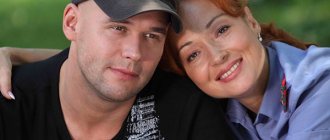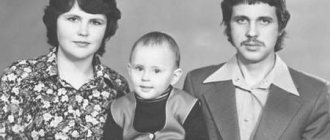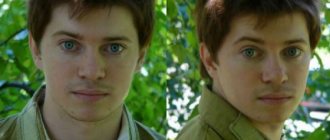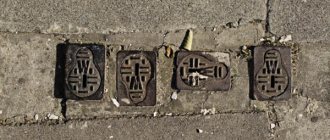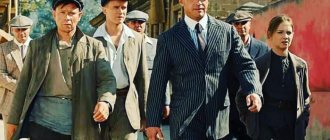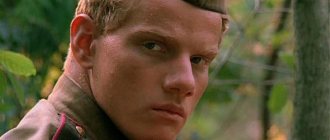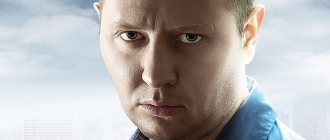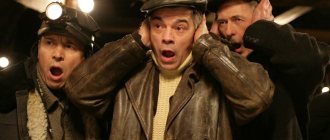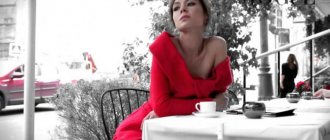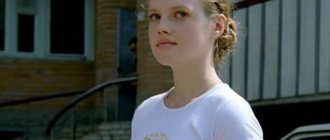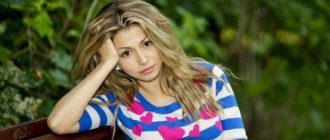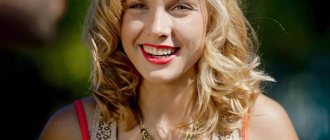Childhood and youth
Maxim was born in 1975 in Moscow. His nationality is Russian, although there is unconfirmed information that he is Jewish. His mother is a dressmaker, his father edited films at Mosfilm, later worked as a decorative artist, and dreamed of becoming an artist. This dream was destined to come true for his son.
View this post on Instagram
A post shared by Maxim Averin (@maximaverin) on Aug 13, 2020 at 1:35am PDT
Maxim Averin in childhood
At the age of 6, Averin first appeared on television. Father took Maxim to the film set in Makhachkala, where the film “The Adventures of Count Nevzorov” was filmed. The child was given a cameo role, and at the age of 9 the young artist entered the Theater of Miniatures and received one of the main roles in the play “Brandenburg Gate”. In addition to the theater, Averin studied in the studio at the House of Cinema.
When the young man was 16 years old, his parents divorced. This greatly influenced the life and character of the teenager, and it took more than one year to forgive loved ones.
At school, Maxim was known as a humanitarian, was interested in literature, and once even refused to take a test in mathematics, explaining that the subject would not be needed at drama school. In the 9th grade, the guy was immersed in choosing an educational institution.
Italian family
When Averin was 16, his parents divorced and since then they have never seen each other again. When their now adult son celebrated his birthdays, the father usually attended the first part of the celebration (for example, at the theater), and the mother came to the party in a restaurant.
Maxim explained their divorce to himself this way: being naturally passionate people, they were simply tired of loving each other.
“I understood them. And their divorce was not a tragedy for me. It was obvious to me that they did not have a common future. Their further life together would simply turn into hell for everyone...”
He himself, despite the enormous influence of his father in choosing a profession, calls himself “mother’s son.” Before her death in 2020, they were very close - they even lived in neighboring apartments. It is unknown whether the amorous Averin introduced his girls to his mother, but the fact that he introduced someone is a 100% fact.
Maxim Averin now
According to information from individual websites, in the fall of 2019, the story about the submarine captain, which began 4 years earlier, will be continued. In the drama “Goryunov. The Ship Sucks”, the hero of Maxim Averin experiences unsuccessful combat trials, demotion and exile to a boat that can be written off for scrap.
View this post on Instagram
A post shared by Maxim Averin (@maximaverin) on Aug 25, 2020 at 6:10am PDT
Maxim Averin in 2020
In the comedy melodrama “The Divisional Commander’s Bride,” the actor again appears in the image of a high-ranking officer. The action takes place in the 70s in a garrison under the command of a general, played by Averin.
Sports achievements[ | ]
- Champion of the 1976 Winter Olympics at distances of 1000 m (1.28.43 min. Olympic record) and 3000 m (4.45.19 min.).
- 1978 world champion in all-around (186.891 points), at distances of 1000 m (1.29.56 min.) and 1500 m (2.21.44 min.).
- Silver medalist at the 1974-1976 World Championships in all-around.
- Bronze medalist at the 1976 Winter Olympics at distances of 500 m (43.17 sec.) and 1500 m (2.17.96 min.).
- Silver and bronze medalist at the 1974-1976, 1978, 1979 World Championships at certain distances.
- Participant in the 1980 Winter Olympics (18th place in the 1500 m distance).
- Absolute champion of the USSR in 1979.
- Repeated champion of the USSR 1973-1975, 1978, 1979 in the sprint all-around and at individual distances.
- Multiple record holder in the 500, 1000 and 1500 m running, classic and sprint all-around.
Instagram and Wikipedia Maxim Averin
To delight fans with footage not only from film sets, but also from everyday life, stars use social networks. Of course, our artist has little time for this, but sometimes photographs appear from his vacation or with friends. Thus, Maxim Averin’s Instagram and Wikipedia are popular among fans, because there you can only find truthful information about the actor’s life.
Also, fans are following the news and are looking forward to some kind of statement about their new lover, because the grounds for this have surfaced more than once thanks to photographs. The only thing is to avoid false information that is easy to stumble upon on the global network.
Height, weight, age of Maxim Averin
Often, before getting acquainted with the biography of a famous person, new fans are interested in external data. This is a normal pattern, because it’s always interesting whether your favorite actor is watching his figure, and for many this becomes an incentive to take care of his body. So it is in our case, and the height, weight, age of Maxim Averin is not a secret. From open sources it can be judged that the actor’s height is just over 190 centimeters, and his approximate weight is 90 kilograms. Such indicators are sufficient to feel confident on stage.
By the way, just recently, Maxim turned 42 years old. But Maxim Averin, whose photos in his youth and now are plentiful on the Internet, will allow you to be convinced that he has hardly changed, despite the figure.
Satan's WORD ABOUT MASKS May 31, 2020 from @oldhellboy Thank God, the beaches have finally been sorted out! There is no need to wear masks on them when you swim and sunbathe. It's a pity, of course. Especially about tanning. Such idiots would go all over the country! Zebra people. But if they have already allowed it, we won’t insist. Thanks for that too. Here, however, the people had additional questions. He, the people, is inquisitive, corrosive, and humorous. I understand about the beaches - he’s asking about theaters. When will they be allowed to perform for masked artists? Opera singers, say? Or ballet? And what about social distancing when he has to take her in his arms? Or to hell with her, the ballerina, let her circle like that, without support? How about the stage? With the Philharmonic? There's an orchestra pit full of them. And what about jazz-blues and choral groups, what will the authorities decide? Howl in chorus in masks? Or is it only possible to have solo albums, under plywood? I started the recording, and moved my hands... Olga Buzova, of course, can sing in a mask, they will only thank her. What about the rest? Again: athletes have such questions about masks... Not good ones. This is how martial arts strive to get into the discussion: they say it takes their breath away. You can't push the barbell. Boxers and wrestlers are wondering: if an opponent’s mask comes off during a punch or hold, will that be disqualified, or what? And who? Runners and jumpers groan. Skaters who, again, are not good at distance. Singles are fine. What about couples? Good for snipers, but what about tennis players? A bobsledder, whether wearing a mask or not, rushes along the track, and let him rush. What about football and hockey? Not the coaches and goalkeepers in goal, but the rest of the staff? What about cyclists and skiers? How about basketball and volleyball players? No way? What about swimmers? We don’t bother ourselves about checkers and chess and we don’t bother people. They'll get over each other. In principle, curling can survive. But equestrian sports... That is, people are wearing masks, it’s clear. And the horses? And if not - why? How should the military go to parades? And how to march on the parade ground? Wearing masks? Cool. Wearing them to the Victory Parade too? What about during exercises? Let's say tank crews, artillerymen, pilots and special forces. Or only the Supreme Commander-in-Chief, the leadership and VIP guests with veterans or, rather, without them are wearing a mask: the risk group has nothing to do at the parade. But, please excuse me for a completely indecent question: how to fight? The VKS in Syria are supposed to fight in masks, or is it possible? Or how will it turn out, at the discretion of the immediate superiors? According to the rules of warfare, is it necessary to provide the enemy with masks before a battle? What do the conventions say about this? And, suppose, the Ukrainian army attacks Donbass, as it has promised from the very beginning of the existence of the current regime in Kyiv, or our territory. AND? Should we fight them with masks, or without masks? In any case, they will later file a lawsuit against us in the International Criminal Court, although they themselves will start this war one hundred percent, but still? Okay, let's not talk about sad things. Should climbers in the mountains, foresters in the forest, fishermen on boats wear masks? And why the hell? Astronauts on the ISS? Should scuba divers wear a protective mask under their snorkel mask? Not to mention water polo and synchronized swimmers, but this is a sport. To wear on airplanes. It's clear. On trains? You are traveling, say, to Vladivostok, in a compartment. Especially in a compartment for two. What about without a mask? In a car, it is simply necessary when you drive it alone and do not intend to take passengers. They came up with sex in Germany and the Netherlands when deciding what rules to introduce for the opening of brothels. Only the knee-elbow position, everyone is wearing masks, end the group, prohibit oral. We don’t need to invent anything there, just a schedule based on house numbers. install. The social distance from face to face will be just one and a half meters. True, there is meaning in such sex... But there isn’t much of it anyway. You listen to what your bosses say about the coronavirus, you watch the news, you sit on social networks, your brain is fucked, you don’t want anything else. And finally: how will we eat and drink in those masks? This is especially important. Special ones are needed, with separate tubes. Minimum for juice, tea, coffee, vodka, whiskey, wine, beer, milk, kefir and water. You put one on, you walk around like a hedgehog or a cow with the udders on your face, your nipples facing out, and you rejoice, rejoice... You sing in a cage on your knees. Only the bell in the nose is missing, dude. Like Danelia in “Kin-dza-dze”. But these are liquids. With soups (there are vegetables, fish and meat in pieces), salads, main courses and desserts. Or like wearing a burqa like women in the Middle East? For men - Tuareg scarves or Palestinian keffiyehs, arafatkas. Lifted, loaded, chewed. You can make them in the colors of the national flag. Can be camouflage. By the way, special forces have these. You can drive with funny pictures: the Japanese will come up with it, the Chinese will produce it. Just give it to us: the authorities will order it, we can fix anything. We will look a little like idiots, but we are already looking more and more like them...
Averina Irina Ivanovna
Cardiologist Senior Researcher
Doctor of Medical Sciences
Education
1997 Izhevsk State Medical Academy (diploma issued on June 25, 1997 АВС0603739), majoring in general medicine. 1997-1998 – internship in the specialty “therapy”. 2000-2002 — clinical residency in the specialty “cardiology” at the Russian Medical Academy of Postgraduate Education, on the basis of the cardiac intensive care unit of the State Clinical Hospital named after. S.P. Botkin. 2004-2008 — postgraduate studies at the National Center for Agricultural Surgery named after. A.N. Bakuleva.
Qualification (Specialty, Category)
Doctor of the highest category
Certificates
Cardiology / 10/31/2020
Averina Irina Ivanovna, Doctor of Medical Sciences, senior researcher at the Federal State Budgetary Institution “National Medical Research Center for Cardiovascular Surgery named after. A.N. Bakulev" of the Russian Ministry of Health. Irina Ivanovna Averina graduated from the medical faculty of the Izhevsk State Medical Academy in 1997 with a degree in general medicine. From 1997 to 1998 she completed an internship in the specialty “Therapy”. From 1998 to September 2000, she worked as a cardiologist at the Cardiology Center in Izhevsk. From 2000 to 2002, she completed clinical residency in the specialty “Cardiology” at the Russian Medical Academy of Postgraduate Education on the basis of the emergency cardiology department, cardiac intensive care unit of the State Clinical Hospital named after. S.P. Botkin. In 2004 she entered the clinical graduate school of the Scientific Center for Cardiovascular Surgery named after. A.N. Bakulev Russian Academy of Medical Sciences on the basis of the department of surgical treatment of interactive pathology. Currently, he is a senior researcher at the Department of Surgical Treatment of Interactive Pathology of the Federal State Budgetary Institution National Medical Research Center for Cardiovascular Surgery named after A.N. Bakulev" of the Russian Ministry of Health. In 2008, Irina Ivanovna defended her dissertation “Assessment of left ventricular remodeling in patients with aortic defects before and after surgical treatment” in the specialty “cardiology”.
67 scientific works were published, including 2 educational and methodological manuals, twice the works were recognized as the best printed works of the National Center for Agricultural Sciences named after. A.N. Bakulev in 2010 and 2020. Areas of scientific research - modern methods of visualization and assessment of myocardial function (intracardiac echocardiography, 3D reconstruction, tissue Dopplerography, particle tracking method, vector analysis of 2D images, magnetic resonance imaging). Irina Ivanovna gives lectures on the topics: “Modern echocardiographic methods for assessing the anatomy and function of the myocardium”, “Assessing remodeling of the left side of the heart”, “Diagnostics, treatment and prevention of acquired heart defects”.
Conducted research under a grant on the topic “Possibilities of tissue Doppler in the early detection of myocardial dysfunction in persons with cardiovascular diseases.” The work highlights key tissue Doppler indicators indicating impaired myocardial function in patients with hypertension, diabetes mellitus and coronary artery disease.
In 2020, she defended her doctoral dissertation on the topic: “Possibilities of diagnosing left ventricular dysfunction with acquired heart defects using modern non-invasive imaging methods to predict the course of the early and late postoperative period.” The work analyzes the fundamental principles of heart movement, technologies that allow for a quantitative assessment of the movement and function of the myocardium, examines the predictive capabilities of cardiac mechanics indicators, and shows the relationship between function and form.
Currently, his area of interest is related to the study of the development of diastolic dysfunction in the postoperative period in patients with acquired heart defects. He takes an active part, makes presentations at international conferences, and is a member of the Russian Society of Cardiology, the European Society of Cardiology, and the American College of Cardiology.
